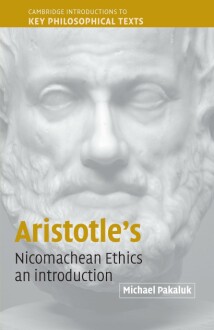Unlocking Aristotle's Wisdom: A Review of Nicomachean Ethics
Key Takeaways
- Comprehensive introduction to Aristotle's ethical theories.
- Enhances understanding of moral philosophy and ethical living.
- Ideal for both beginners and experienced readers.
- Connects ancient philosophy with modern spiritual practices.
Delve into the profound insights of Aristotle's Nicomachean Ethics with this comprehensive introduction that unpacks the essential themes and concepts of one of philosophy's most significant texts. This Kindle edition provides readers with a rich understanding of moral philosophy, illuminating the path toward ethical living and personal growth.
Whether you are a seasoned philosopher or a curious newcomer, this book serves as a valuable resource for exploring the intricate connections between ethics and modern spirituality, aligning perfectly with the principles of philosophical texts and spiritual growth.
About Aristotle's Nicomachean Ethics
Aristotle's Nicomachean Ethics is a foundational text in the history of philosophy, offering a comprehensive exploration of moral philosophy and the nature of ethics. Written by one of the most influential thinkers in Western philosophy, this book delves into the principles of ethics, examining the concept of virtue, the importance of character, and the role of reason in moral decision-making.
Throughout the book, Aristotle presents a nuanced and systematic approach to ethics, considering the complexities of human nature and the challenges of living a virtuous life. His ideas have had a profound impact on the development of Western philosophy, influencing thinkers from ancient Greece to modern times.
| Key Features | Description |
|---|---|
| Comprehensive Introduction | This book provides a detailed and accessible introduction to Aristotle's ethical theories, making it an ideal resource for both beginners and experienced readers. |
| Systematic Approach | Aristotle's Nicomachean Ethics presents a systematic and nuanced approach to ethics, examining the principles of virtue, character, and reason in moral decision-making. |
| Historical Significance | This book has had a profound impact on the development of Western philosophy, influencing thinkers from ancient Greece to modern times. |
Virtue and Character
Aristotle's Nicomachean Ethics places great emphasis on the importance of character and virtue in moral decision-making. He argues that virtues are habits or states of being that enable individuals to live a good life, and that character is shaped by a combination of nature, nurture, and habit.
- Virtues are habits or states of being that enable individuals to live a good life.
- Character is shaped by a combination of nature, nurture, and habit.
Reason and Moral Decision-Making
Aristotle's Nicomachean Ethics also emphasizes the role of reason in moral decision-making. He argues that reason is essential for making sound moral judgments, and that individuals must use their rational faculties to distinguish between right and wrong.
- Reason is essential for making sound moral judgments.
- Individuals must use their rational faculties to distinguish between right and wrong.
What You Can Expect from Aristotle's Nicomachean Ethics: An Introduction
Pros
- Comprehensive and accessible introduction to Aristotle's ethical theories.
- Ideal for both beginners and experienced readers, providing a rich understanding of moral philosophy.
- Systematic and nuanced approach to ethics, examining the principles of virtue, character, and reason in moral decision-making.
- Historical significance and influence on Western philosophy, making it a valuable resource for understanding the development of philosophical thought.
- Clear and concise writing style, making it easy to follow and understand complex philosophical concepts.
Cons
- Some readers may find the text dense and requiring significant background knowledge of philosophy.
- A few sections may be overly focused on specific historical or cultural context, potentially making it difficult for readers to fully grasp the main ideas.
- The book's emphasis on reason and rationality may not resonate with readers who prefer more intuitive or emotional approaches to ethics.
In conclusion, Aristotle's Nicomachean Ethics: An Introduction offers a wealth of valuable insights and perspectives on moral philosophy. While it may present some challenges for readers, the rewards are well worth the effort. With its comprehensive and accessible approach, this book is an essential resource for anyone seeking to deepen their understanding of ethics and morality.
Unlocking the Secrets of Aristotle's Nicomachean Ethics: A Guide for the Modern Reader
As you've reached the end of this review, you're likely wondering if Aristotle's Nicomachean Ethics: An Introduction is the right book for you. To help you make an informed decision, here are some tips for buyers to keep in mind when shopping for similar products:
- Look for books that provide a clear and concise introduction to Aristotle's ethical theories, making it easy for readers to follow along.
- Consider books that offer a systematic and nuanced approach to ethics, examining the principles of virtue, character, and reason in moral decision-making.
- Keep in mind that some books may be overly focused on specific historical or cultural context, so look for texts that strike a balance between theory and practical application.
- Avoid books that prioritize reason and rationality over other approaches to ethics, as this may not resonate with readers who prefer a more intuitive or emotional approach.
Now that you've read this review, you're probably wondering if Aristotle's Nicomachean Ethics: An Introduction is the right book for you. Here's a summary of the benefits and drawbacks:
| Benefits | Drawbacks |
|---|---|
| Comprehensive and accessible introduction to Aristotle's ethical theories. | Some readers may find the text dense and requiring significant background knowledge of philosophy. |
| Ideal for both beginners and experienced readers, providing a rich understanding of moral philosophy. | A few sections may be overly focused on specific historical or cultural context. |
| Systematic and nuanced approach to ethics, examining the principles of virtue, character, and reason in moral decision-making. | The book's emphasis on reason and rationality may not resonate with readers who prefer more intuitive or emotional approaches to ethics. |
In conclusion, Aristotle's Nicomachean Ethics: An Introduction is a valuable resource for anyone seeking to deepen their understanding of ethics and morality. With its comprehensive and accessible approach, this book is an essential resource for anyone interested in philosophical thought.
So, what's the final recommendation? If you're a philosophy enthusiast or a curious newcomer looking to explore the world of ethics and morality, Aristotle's Nicomachean Ethics: An Introduction is an excellent choice. With its clear and concise writing style, this book is an accessible and engaging introduction to Aristotle's ethical theories. It's a must-read for anyone interested in philosophical thought and its applications in modern life.
Check Current PriceDemystifying Aristotle's Nicomachean Ethics: Your Questions Answered
-
Q: What is the main focus of Aristotle's Nicomachean Ethics?
A: Aristotle's Nicomachean Ethics primarily explores the nature of ethics and moral philosophy, examining the concepts of virtue, character, and reason in moral decision-making.
-
Q: Is the book suitable for beginners in philosophy?
A: Yes, the book provides a comprehensive and accessible introduction to Aristotle's ethical theories, making it an ideal resource for both beginners and experienced readers.
-
Q: How does Aristotle's Nicomachean Ethics relate to modern spirituality and philosophical texts?
A: The book's focus on ethics and moral philosophy aligns with the principles of modern spirituality and philosophical texts, offering a valuable resource for understanding the connections between ancient philosophy and contemporary spiritual practices.
-
Q: Are there any criticisms of Aristotle's Nicomachean Ethics?
A: Some readers may find the text dense and requiring significant background knowledge of philosophy. Additionally, a few sections may be overly focused on specific historical or cultural context, potentially making it difficult for readers to fully grasp the main ideas.













